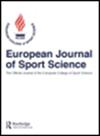咖啡因对吸气肌功能的影响
IF 3
3区 医学
Q2 SPORT SCIENCES
引用次数: 4
摘要
研究表明,咖啡因可以增强上肢和下肢肌肉力量的测量,尽管文献有些模棱两可。咖啡因是否会提高最大吸气压力(MIP),这是吸气肌力量的替代测量,目前还知之甚少。这项研究的目的是确定中等剂量的咖啡因对吸气肌功能的影响。健康成人15例(男8例,女7例)(平均±SD:年龄= 24.3±6.4岁;高度= 1.75±0.11 m;体重= 78.8±16.5 kg)的志愿者参加了这项采用双盲、安慰剂对照、交叉设计的研究。在初次访问期间,收集基线数据,并熟悉参与者的吸气肌测量。在第二次和第三次访问中,参与者摄入5mg kg - 1剂量的咖啡因(CAF)或安慰剂胶囊(PL)。一小时后,他们完成了至少12次最大吸气动作,每次尝试之间休息1分钟。记录MIP、最大吸气峰压(PP)和最大压力发展率(MRPD)。CAF试验导致MIP显著升高(154.7±35.8∶146.6±37.6 cmH2O;p = 0.02)和PP(165.8±36.8∶158.3 cmH2O;p = 0.01)。MRPD差异无统计学意义(p = 0.18)。与安慰剂相比,摄入咖啡因后MIP和PP有所改善。这项研究的结果进一步证实了咖啡因对肌肉力量的潜在益处。本文章由计算机程序翻译,如有差异,请以英文原文为准。
Effects of caffeine on inspiratory muscle function
Abstract Research suggests that caffeine can enhance measures of muscular strength in the upper and lower extremities, although the literature is somewhat equivocal. Little is known on whether or not caffeine will improve maximal inspiratory pressure (MIP), a surrogate measure of inspiratory muscle strength. The purpose of the study was to determine the effects of a moderate dose of caffeine on inspiratory muscle function. Fifteen (8 male, 7 female) healthy adults (mean ± SD: age = 24.3 ± 6.4 years; height = 1.75 ± 0.11 m; body mass = 78.8 ± 16.5 kg) volunteered to participate in the study which used a double-blind, placebo-controlled, cross-over design. During the initial visit, baseline data was collected and participants were familiarized with inspiratory muscle measurements. For the second and third visits, participants ingested either a 5 mg kg−1 dose of caffeine (CAF) or placebo capsule (PL). After one hour, they completed at least 12 maximal inspiratory manoeuvres with 1 min rest between each attempt. MIP, maximal inspiratory peak pressure (PP), and maximal rate of pressure development (MRPD) were recorded. The CAF trial resulted in significantly higher MIP (154.7 ± 35.8 vs. 146.6 ± 37.6 cmH2O; p = 0.02) and PP (165.8 ± 36.8 vs. 158.3 cmH2O; p = 0.01) compared to the PL condition. No significant difference was observed in MRPD (p = 0.18). MIP and PP improved after ingestion of caffeine compared to the placebo condition. The findings from the study further establish caffeine’s potential ergogenic benefit on measures of muscular strength.
求助全文
通过发布文献求助,成功后即可免费获取论文全文。
去求助
来源期刊
CiteScore
6.60
自引率
3.10%
发文量
153
审稿时长
6-12 weeks
期刊介绍:
The European Journal of Sport Science (EJSS) is the official Medline- and Thomson Reuters-listed journal of the European College of Sport Science. The editorial policy of the Journal pursues the multi-disciplinary aims of the College: to promote the highest standards of scientific study and scholarship in respect of the following fields: (a) Applied Sport Sciences; (b) Biomechanics and Motor Control; c) Physiology and Nutrition; (d) Psychology, Social Sciences and Humanities and (e) Sports and Exercise Medicine and Health.

 求助内容:
求助内容: 应助结果提醒方式:
应助结果提醒方式:


